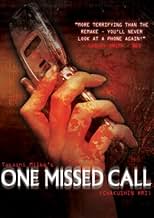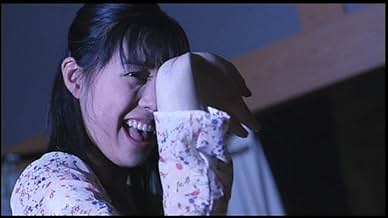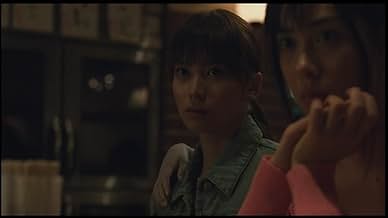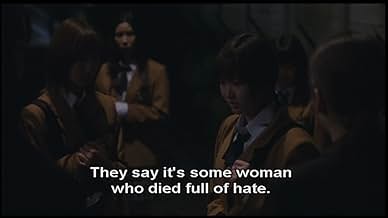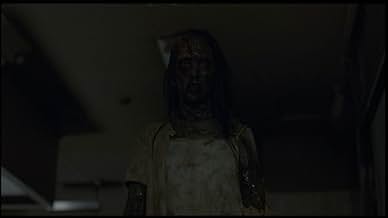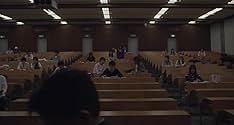NOTE IMDb
6,2/10
20 k
MA NOTE
Des personnes commencent mystérieusement à recevoir des messages vocaux de leur futur moi, prédisant leur mort.Des personnes commencent mystérieusement à recevoir des messages vocaux de leur futur moi, prédisant leur mort.Des personnes commencent mystérieusement à recevoir des messages vocaux de leur futur moi, prédisant leur mort.
Histoire
Le saviez-vous
- AnecdotesDuring the opening credit sequence, one of the cell phone ring-tones is the theme song from an earlier Takashi Miike film, Gozu (2003).
- GaffesYumi arrives at the abandoned hospital at 6:45 p.m. on April 24, and it's nighttime. On that date, sunset in Japan ranges from around 6:20 p.m. Japan Standard Time in the east, near Tokyo, to around 6:55 p.m. in the west, near Nagasaki. Depending on what part of Japan she is in, it should be daytime or twilight outside, not full dark.
- Citations
Yoko Okazaki: Oh no, it's raining.
- ConnexionsFeatured in Chakushin ari meikingu: Chakushin rireki (2003)
- Bandes originalesIkutsuka no Sora
(Few Skies)
Vocal by Kô Shibasaki (as Kou Shibasaki)
Written by Yasushi Akimoto
Composed by Jin Nakamura
Arranged by Chokkaku
Universal J / Chimera Energy
Commentaire à la une
Well, what can I say? Takashi Miike's take on the whole so-called J-horror hoopla. I bet he was thinking "I can do this too. And I can do it better". And you know what? He was right! RINGU can be considered as the original one that started it all (because of being the first big hit in the genre, for one thing). I'm not even gonna argue about whether it's the best J-horror movie or not. But I am gonna say that ONE MISSED CALL is without a doubt, on some levels, more effective than RINGU. Where Sadako's ghostly tale of terror was sort of touching the boundaries and establishing some clearly defined characteristics of the genre, CHAKUSHIN ARI pushes the boundaries and uses these characteristics as a reference to the genre.
Miike handles a very tight script and a plot that has virtually no holes and a lot of eye for details. Almost every little aspect that is being mentioned in the plot, carries a little set-up within that delivers a pay-off later. The story is intriguing. The death scenes are original and rather graphic. The ghostly creepiness is there. Every jump-scare works (there was one were I almost went through the roof! I recommend watching this with the sound turned up a notch; just let it blast out of the speakers, and I guarantee you: you will jump!). The conclusion is great and practically unpredictable; the twists were damn good. And then there's Miike, who just once again had to give this movie that Miike-touch of his, making it all just one bit more special in a way. And this time, surprisingly, he doesn't do it in the usual way. Not be inserting a sickening scene, or adding some repulsive imagery (though some events and effects really are quite gruesome). No. This time he does it by taking the movie to a different level, by adding that very last scene. And the very last shot should normally have you thinking about something that someone in a very brief scene said, earlier in the movie. The effect it had on me was: wanting to re-watch the movie. Now that's just great if a movie manages to do that. So maybe I should really rate this one 10/10. But I'll reserve that rating for THE AUDITION, my favorite Takashi Miike film ever (for now, at least).
And, by the way: I'm ready for the re-make. It's gonna be directed by Frenchman Eric Valette, who previously directed the magnificent, claustrophobic & Lovecraftian-like MALÉFIQUE. For once, I just might have a little faith in an upcoming re-make.
Miike handles a very tight script and a plot that has virtually no holes and a lot of eye for details. Almost every little aspect that is being mentioned in the plot, carries a little set-up within that delivers a pay-off later. The story is intriguing. The death scenes are original and rather graphic. The ghostly creepiness is there. Every jump-scare works (there was one were I almost went through the roof! I recommend watching this with the sound turned up a notch; just let it blast out of the speakers, and I guarantee you: you will jump!). The conclusion is great and practically unpredictable; the twists were damn good. And then there's Miike, who just once again had to give this movie that Miike-touch of his, making it all just one bit more special in a way. And this time, surprisingly, he doesn't do it in the usual way. Not be inserting a sickening scene, or adding some repulsive imagery (though some events and effects really are quite gruesome). No. This time he does it by taking the movie to a different level, by adding that very last scene. And the very last shot should normally have you thinking about something that someone in a very brief scene said, earlier in the movie. The effect it had on me was: wanting to re-watch the movie. Now that's just great if a movie manages to do that. So maybe I should really rate this one 10/10. But I'll reserve that rating for THE AUDITION, my favorite Takashi Miike film ever (for now, at least).
And, by the way: I'm ready for the re-make. It's gonna be directed by Frenchman Eric Valette, who previously directed the magnificent, claustrophobic & Lovecraftian-like MALÉFIQUE. For once, I just might have a little faith in an upcoming re-make.
- Vomitron_G
- 13 déc. 2006
- Permalien
Meilleurs choix
Connectez-vous pour évaluer et suivre la liste de favoris afin de recevoir des recommandations personnalisées
- How long is One Missed Call?Alimenté par Alexa
Détails
Box-office
- Montant brut mondial
- 17 605 379 $US
- Durée1 heure 52 minutes
- Couleur
- Mixage
- Rapport de forme
- 1.85 : 1
Contribuer à cette page
Suggérer une modification ou ajouter du contenu manquant

Lacune principale
By what name was La Mort en ligne (2003) officially released in India in English?
Répondre

